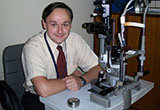 I recently had the single pleasure of undergoing exit exams run by the Royal College of Ophthalmologists and could not help but wonder at how examiners could on the whole be easily categorised into certain subtypes which readers may find fascinating. This phenomenon has certainly has not been observed before in published world literature.
I recently had the single pleasure of undergoing exit exams run by the Royal College of Ophthalmologists and could not help but wonder at how examiners could on the whole be easily categorised into certain subtypes which readers may find fascinating. This phenomenon has certainly has not been observed before in published world literature.
First, and certainly foremost, is the kindly empathetic Jean Valjean examiner. Shown kindness by others and helped along the way they are keen to repay their debt and help the younger generation by teaching and by lenient examination. “Who am I?” they ask themselves “to condemn this man to misery, pretend I do not feel his agony. This innocent who bears my face and goes to judgement in my place? When kindness was shown to me who am I to harass? What will I do? I will let him pass.” Unless serious errors are made then progress is assured and the debt of kindness is then perhaps passed on.
Second, and most feared, is the Javert style of examiner. “Tell me quickly what’s the story, your diagnosis and your plan. Don’t mumble, I can’t hear you. Speak up like a man.” But Javert had no kindness shown him and thus judged others by the harsh measure that they themselves had always been judged by, without mercy. The hapless candidate usually senses approaching doom, but almost always any attempt to remedy the situation is futile. “I’ve been studying now for six months, not seen my kids since they were this high. Holy God is there no mercy; if you fail me I shall die.” Javert is always unmoved though. “I have heard such protestations every exam for twenty years. Reapply again for next year, save your breath, and save your tears.” These unbending individuals, almost always brilliant in their own way, usually seek to destroy the vast majority of those they examine and indeed perhaps teach as a way of retaliation against a thousand and one perceived insults other people have visited upon themselves over the years.
Unexpectedly a Gavroche examiner can undo much damage inflicted by a potential Javert. Usually a new examiner paired with an old war horse like Javert is liable to look kindly and write positive things about the candidate to make up for the perceived injustice while perhaps appearing cowed and submissive. “When marking this take special note of my fellow here. I know this man my friends his name is Javert. So don’t believe a word he says cos’ none of it’s true. It only goes to show what new examiners can do.”
There is then a certain type of Cosette examiner that wishes they were anywhere but there. You can almost sense their daydreams as you enter the room and their look of sheer bored detachment as you begin examining the patient. “There is a castle on a cloud, I like to go there when I can” you can sense them singing. “No more people for me to greet, not like it is in this exam.” Perhaps these examiners are the second most dangerous as their level of detachment is such that often their comments seem to bear no resemblance to anything that actually took place and large tracts may have been invented from thin air to fill an empty void in both the room and the examiner.
Another dangerous phenomenon is that of the overly friendly examiner, and the Thenardier examiner is always overly friendly. “Welcome monsieur, sit yourself down and meet the best examiner in town. Not like the rest, all of them bad, mean and selfcentred and making you sad. Seldom do you see honest men like me; for false reassurance I have a knack but I’ll stab you in the back.”
There is nothing worse for a candidate than to fail and see others pass and leave the study group. “There’s a grief that can’t be spoken. There’s a pain goes on and on. Empty chairs at empty tables. Now my friends have passed, and gone.” Passing final postgraduate exams is such a high and important barrier for a doctor that although it is impossible to see over into what lies beyond the more difficult it is to achieve the greater still the sense of importance this achievement holds. “Who will join my study group, who will be strong and study with me? Beyond this FRCOphth is there a world you want to see? Then join in the fight that will give you the right to be free! Can you give what you can give so that your career can advance? Some will pass and some will fail, will you stand up and take your chance? The cash of the failures will help our Royal College finance.”
Passing exit exams is one of the most stressful and difficult times a doctor goes through on the path to consultanthood. While training in the US and in Europe is commonly shorter, better supported, and with exams that have a much higher pass rate it is commonly said that UK doctors end up with greater skills after attaining CCT. Despite this when it is possible to make or break a career on the whim of an examiner it makes us all miserables.
Competing interests: None declared.
Gwyn Samuel Williams, ST6 Ophthalmology, Singleton Hospital, Swansea.
